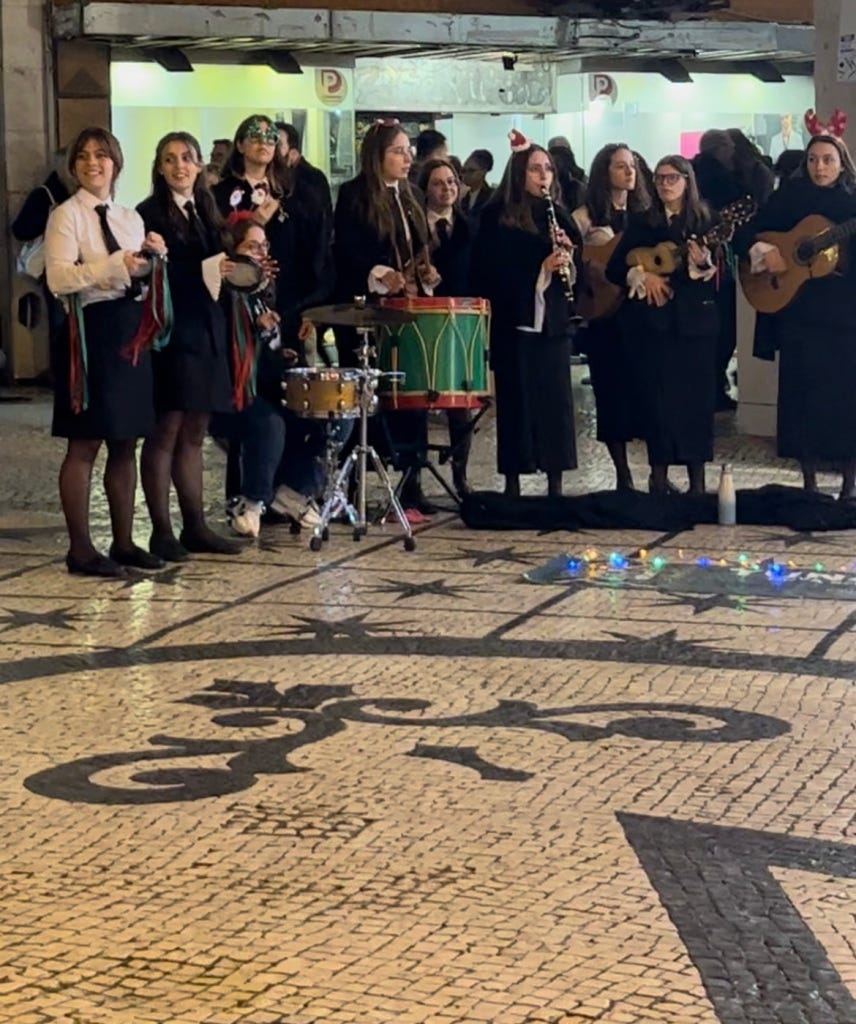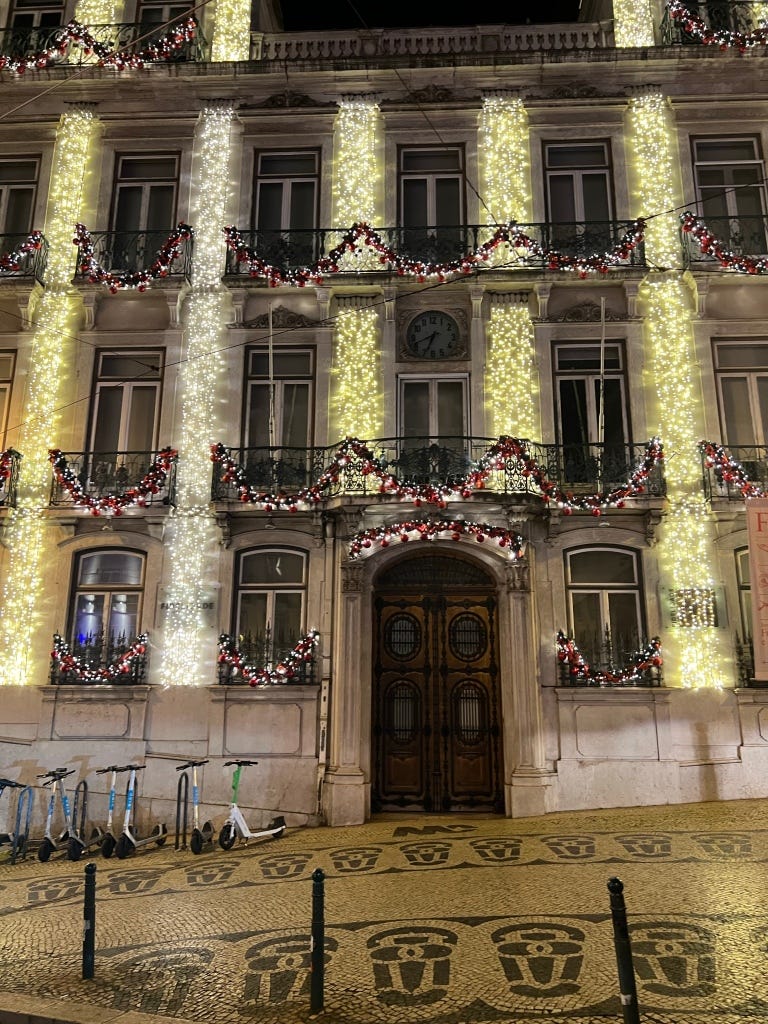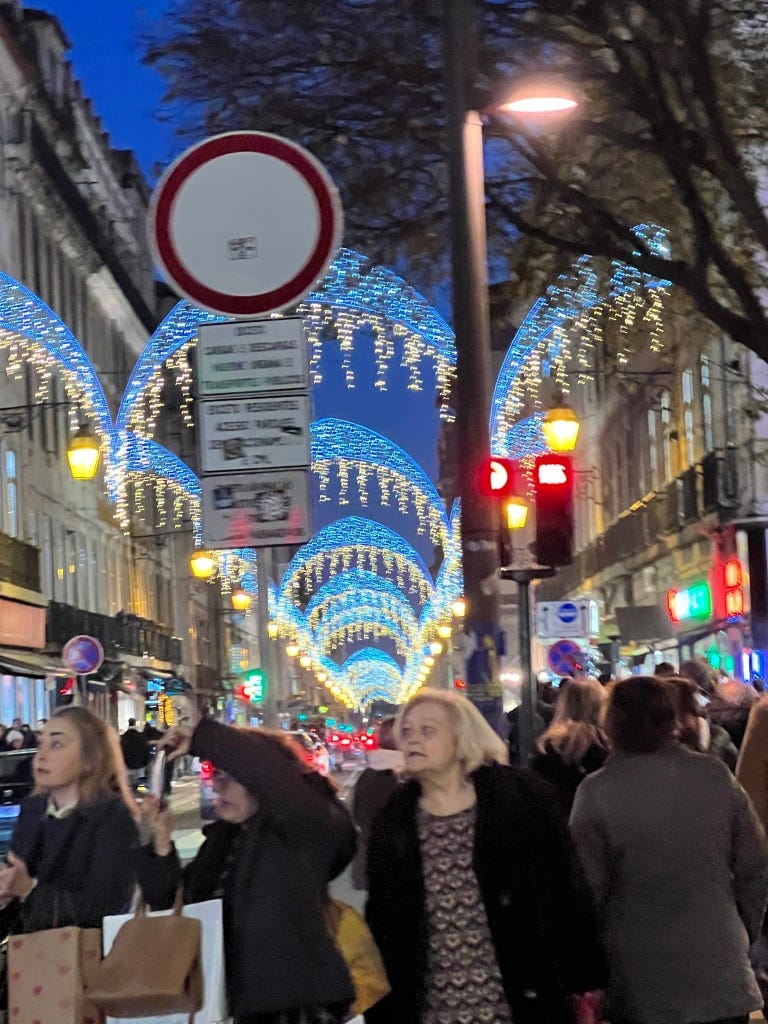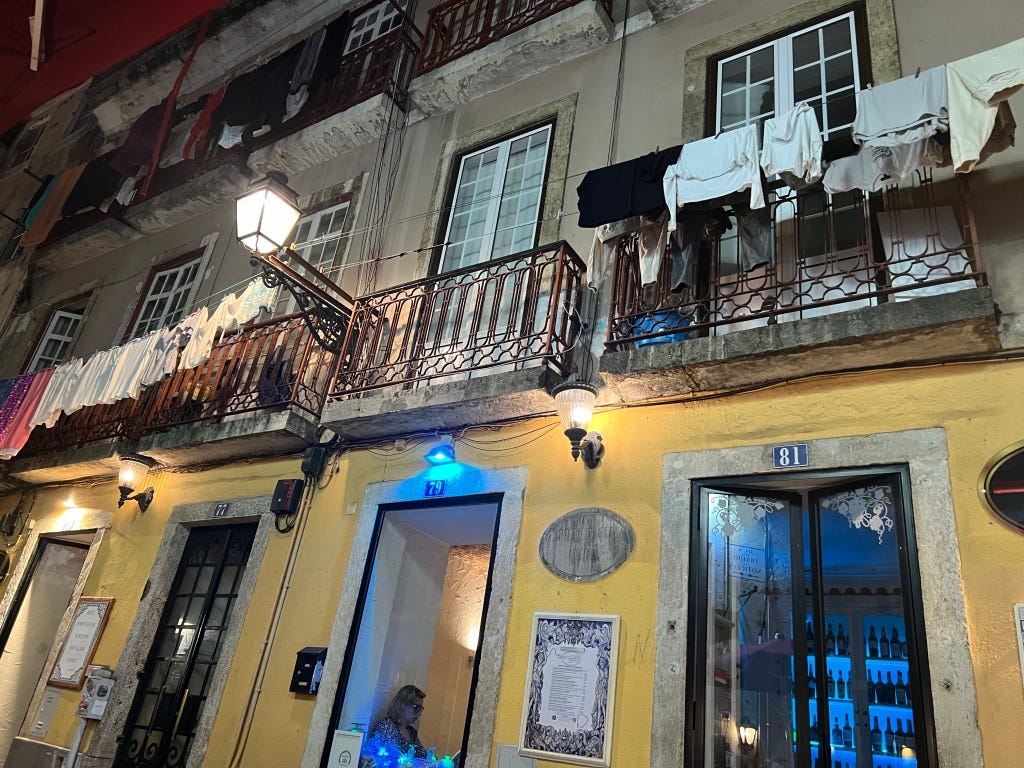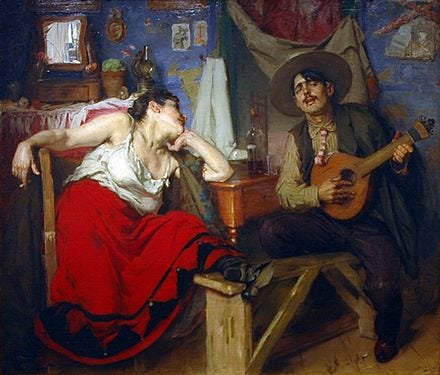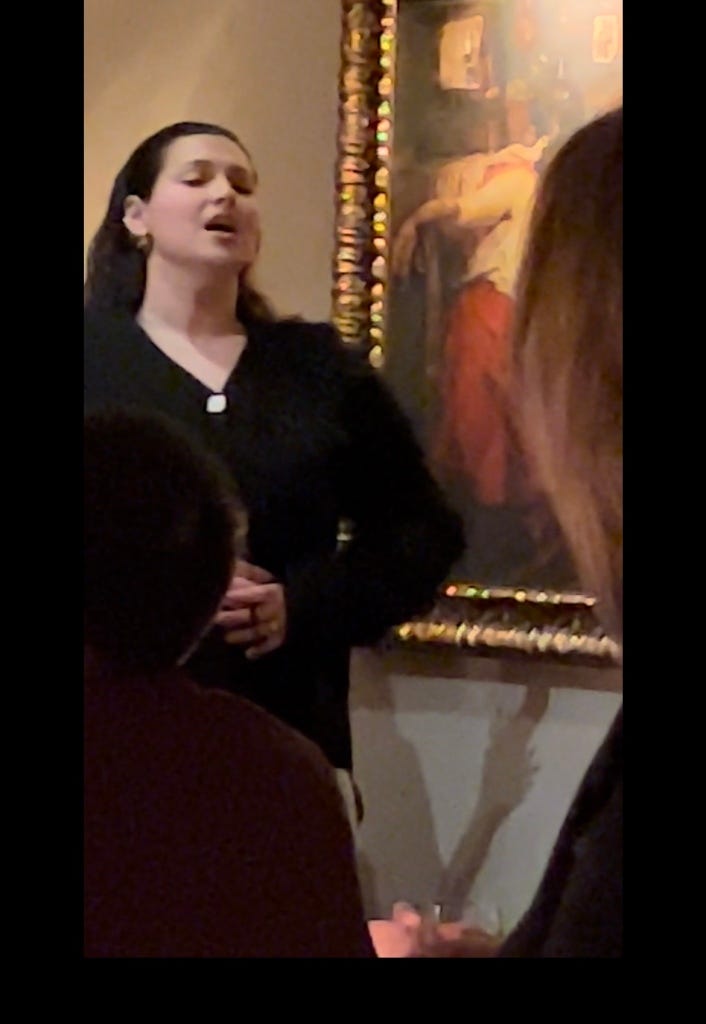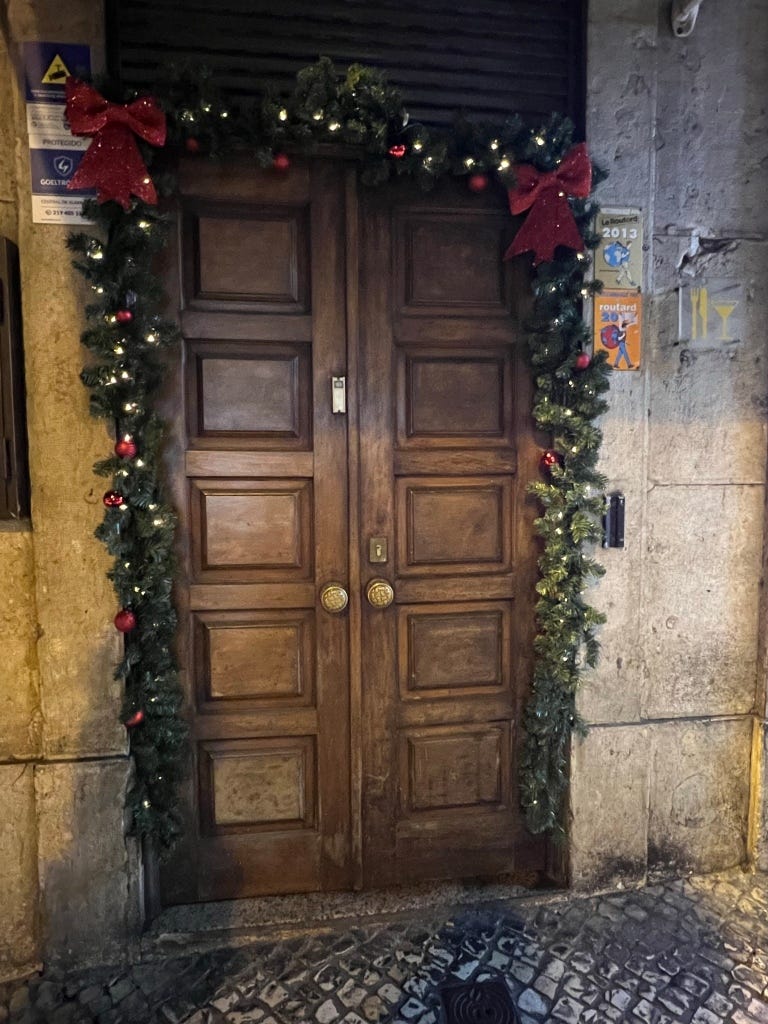A Night in Lisboa
Last night the h took me to dinner at O Faia, a Fado restaurant in Lisboa. We took the train in, having to stand the whole way packed shoulder to shoulder and front to back. There was a lot of sneezing and hacking at my level so I masked up; the h towered over everyone and kept me pulled close for balance. It’s only a 15 minute trip. Rossio Station was as full of people as the trains and we spilled out onto streets that crackled with energy, crowds flowing up and down the sidewalks and gathered around street performers, mostly singers but a few street dance troupes as well.
We did a little Christmas shopping, admiring the beautiful baked goods celebrating the season on display in the windows of the padarias and the Christmas lights (luzes de Natal) lining the streets and buildings.
We walked streets jammed with cafes, restaurants and bars, many with affable fellows standing at the door hawking the menus to passersby. We stopped and had pre-dinner drinks - the h a pint, me a glass of white wine from Alentejo along with a local cheese and garlicky olives. As we snacked the candlelit wine bar opposite us began to fill with elegantly dressed patrons. Above it, a woman leaned out of her second story window pulling in the clothes from her clothesline. I used to think the sight of the hanging clothes that festoon every balcony in Portugal, no matter what neighborhood you are in, despoiled the view but I don’t feel that way anymore - it’s ecologically sound and efficient to hang your clothes to dry in a country with 300 sunny days a year. It also gives me a sense of community and connectedness - we all have to dry our clothes, the retractable clotheslines that are a feature of every apartment are like airy welcome mats, sweats and blouses waving at me from on high, towels and sheets flapping like flags of friendship.
Then we wandered around people watching until it was time for our reservation. The restaurant was quiet with white-jacketed waiters eddying among the tables. There was no stage, just a recessed alcove just large enough for two chairs for the guitarists, and a singer. On the wall of the alcove hung a reproduction of the famous oil painting Fado by Jose Malhoa and never has an artist captured so perfectly the sensibility of a form of music.
See that lady? She is the figurative embodiment of Fado - saturated with passionate longing. Portugal is the birthplace of Fado, which dates back to the early 1800s and is described as “a form of music characterized by mournful tunes and lyrics…infused with a sense of resignation, fate and melancholy, and the lifelong damage of permanent irreparable loss ” which is basically the only kind of music I listen to, something the h is of course aware of so taking me to a melancholic supper club was the perfect birthday present.
You can listen to anything you want as long as it’s not Coldplay, the h will gently tease me (I listened to Coldplay’s Fix You on repeat for more than a year after my ex-died).
The waiters spoke English and also Spanish, French, Italian and Arabic, from what I could gather by the conversational babble all around us. Do you prefer the menu in English, our waiter inquired, and I said although I don’t yet speak Portuguese well I would like to practice, at which he smiled and said a bunch of stuff I did not understand at all. Tudo bem! I exclaimed and he laughed with me, not at me, I feel (almost) certain.
Dinner was excellent, from the sopa de cogumelo sprinkled with multi-colored edible flowers to the abacaxi surrounded by a birthday message written in burnt caramel, arriving with complimentary glasses of muscatel for a toast.
In between courses the Fado singers performed. The first singer was a dark haired young woman who sang with her eyes closed, her Mona Lisa face pointed toward the ceiling, revealing the muscular column of her throat. Her powerful, sorrowful voice filled the room without the aid of any amplification.
After the second course a man took the stage; slim and bespectacled, hand in pocket, jacket buttoned with no tie, I took him to be the restaurant owner, he had an air of casual authority. Then the guitarists started to play and it turned out the man was the second Fado singer of the evening.
The third singer arrived after dessert was served, and immediately it was apparent the playbill saved the best for last. Her voice was equal parts raw beauty and raw power; she ripped the red shawl from her shoulders and crushed it in her hands or whipped it against the floor as she sang her anguished songs. In between numbers she introduced the extraordinary guitarists accompanying her, and spoke a bit about the traditional songs she was singing. I was able to catch about half the words.
About half of the restaurant patrons were Portuguese, some with tears in their eyes as they mouthed the words along with the singer, leaping to their feet to applaud each song. One man called out a compliment to the final singer of the evening which she received with a deft and accomplished graciousness.
After coffee and a little palate pleaser courtesy of the chef - an airy light fritter with cinnamon sugar, a specialty of the Christmas season, each singer came out to perform one final song, with a surprise - a diner from the audience rose and took the stage, a young woman with a mournful unsmiling face. With her light brown hair in a bun and her rimless glasses she looked like a librarian…until she began to sing in a throaty alto punctuated with passionate gesticulations as she stalked the tight alcove, as if the space could not contain all her sadness. Although her voice was not as trained or professional as the other three singers, she got an A for effort and the audience was generous with its applause. She sat down and only then did she smile, pulling the clip from her hair to let it cascade down her back. With all the local Fado appreciators in the audience and the skill evinced by the evening’s singers and guitarists, I imagine it was quite nerve wracking to take the stage.
I was so glad we stayed for the whole performance - near the end, the guitarists performed a beautiful and complicated number that had the crowd cheering at their display of mastery of their 12-string guitars. Then the red-shawled singer took the stage a final time to shake us from our food coma, the audience joining her for the refrain, la di da da di da.
Then we spilled into the street, the waiters all wishing me a happy birthday in the waning minutes of my last day of being no older than sixty. Walking to Rossio Station, the streets were jammed with mostly young people, talking and singing and laughing. What is it about the energy of a city that is so infectious - I will always love it so.
We caught the 12:29a, the last train to Sintra, again having to stand because of the crowds. We arrived home to a sleeping house, Jake barking hello and insisting on sleeping curled between our faces, his chin on the h’s pillow. Perhaps there is a lingering anxiety of separation; he was happy with his babysitter Joyce in the almost two months he lived with her, but despite the two Lab friends and sleeping on a bed each night and wandering the property at will, he always made it clear he wanted to leave with us, and we always had to hide our tears and tell him we’d all be back together, forever, soon.


